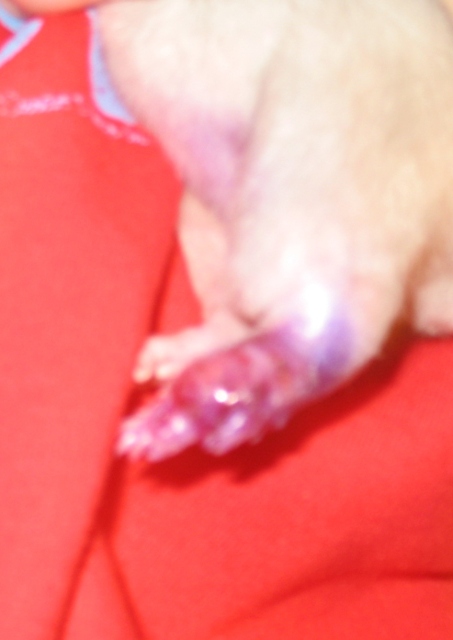QuestionQUESTION: I have owned rats for a long time, and i use to always buy them from pet shops. After i had to watch too many of my little girls pass away from mycoplasma, i decided to get a breeder rat instead. However, i still had one of my petstore rats who had mycoplasma, and so my once healthy breeder rat cought it as well. I was wondering if there was anything i could do to get rid of it. I feel bad getting healthy breeder rats if they're just going to get infected with mycoplasma as soon as i take them home. The only thing i could think of was to wait till all my infected rats passed away before getting more healthy rats, but it would be very hard to wait that long. Is there anything i can do to try to prevent my healthy rats from being infected?
ANSWER:
Hi Lindsey
One thing you may not know is that all rats, breeder rats, pet store rats and feeder rats, are born with mycoplasmosis. It is found in the uterus of the female rat and they are exposed to it during birth.
Myco is not only responsible for respiratory infections, but it can trigger urinary tract infections, uterine infections in females and otits media (inner ear infection)
The reason people say to get rats from a breeder is because the breeder does not inbreed for starters and they keep track of their rats health history such as cancers, brain disorders and especially megacolon. Also, they are usually very social as well. I had four rats from a breeder and two are dead and they have not even had their 2nd birthday yet. One died from a brain abscess and the other died from pneumonia due to chronic mycoplasmosis. One is blind in both eyes from unknown reasons, we are thinking it was a virus, and the other had a terrible eye infection and despite treatment, he had to have his eye removed.
Two had to be neutered the second day I had them because they were fighting like crazy and one of them had two tumors that were discovered under the arm. They were from a so called reputable breeder.
As for mycoplasmosis, like I said, all rats are born with it but chances that they came from a home that practiced good husbandry is one reason they dont go to the person that bought them already sick is because they were in clean cages and were fed the proper food and were not kept in a tank on pine or cedar. They were handled at birth and should be social.
The key to keeping your rat from coming down with symptoms of myco is to keep the rat healthy and stress free and this will keep their immune system health.
I have a page devoted to how to hold myco at bay to keep it from developing. This includes proper husbandry and also proper diet. Building the immune system is key, and the stronger the immune system is the better chance the rat has fighting off myco.
Learn everything about myco here on my site:
http://www.freewebs.com/crittercity/mycoplasmosispage.htm
One reason rats that are bred by a knowledgeable breeder is because they also stop using Does and Bucks that are prone to illness simply due to a weaker immune system. The hairless rat, for example, lacks and thymus gland thus in turn they have a weaker immune system. Breeding a strong breed of hairless takes alot of research and education which is why the hairless rats did not live past 12 months old many years back. Now they are living past 2, thanks to the responsible and educated breeder.
ALso, please look over my site and on the drop down list, go to the quarantine page.
This applies for both pet store rats and well bred rats as well and here is why:
Lets say that a girl named Sue wants to buy more rats so she goes to a breeder to pick out two new rats. Meanwhile, she had just left a pet store and was holding and petting the petstore rats there. Sue leaves the petstore and heads to the breeders. She has no clue that the rats she was holding were harboring a virus and now Sue has this virus all over her, from her hands to her clothing where she was holding the rats. SHe has it even in her nose because the virus is inhaled and adheres to the mucus membranes. Meanwhile, she goes to the Breeders and even though the breeder may ask her to wash her hands the virus remains on her clothing etc....and some of these germs live for up to 3 hours. A good breeder will ask the person coming to see her rats if they had been around strange rats prior to coming to her rattery but one that is not as experienced will not think to ask this. Long story short, chances that Sue passed the virus she was carrying to the breeders rats are there and if she doesnt clean up or at least keep away for 3 full hours she will bring the virus home to her house too.
Sounds really far fetched right? It is very true, which is why SDA and SENDAI remain active among our rodents esp pet store rats.
Hope this helps some! If you need anything else just let me know!
---------- FOLLOW-UP ----------
QUESTION: So basically you're saying there's nothing i can do to prevent my girls from getting myco. Its inevitable. I was giving my girls baytril for a while and it helped them a lot. One of my rats, Salena, was on baytril, though she showed no signs of myco. Then she got pregnant so i took of off her medication and she started showing signs of myco! This really bums me out because i didn't want her babies to get the disease.
I keep my rats in a large, clean cage and they get lots of exercise. They are both very social rats, so i dont think they're under much stress. So should i just keep bringing home new "healthy" rats even though i know they're going to be infected?
Thanks for all your help!
AnswerI also had my rats on baytril for life but it should only be done once they show signs of chronic myco.
Just remember, all rats are born with mycoplasmosis. The only rats that arent are lab raised, pathogen free born through c-section.
I had four of those years back and soon as I got them home BAM! sick! They were SO sickly because they had no exposure to any outside pathogens. They were lab rats and there were at least 4 dozen of them that were to be destroyed after they were done being used so there was a huge rescue and all of us compared notes and they were all sickly once we got them home. Like a human child that first starts preschool and it seems their nose runs 24 hours a day because they need to build immunities to all the viruses around them. Healthy kids with normal immune systems DO, while the ones with the weaker immune systems seem to be sick left and right.
As my website states, keeping the rats healthy and stress free helps the immune system. Once the rat does show signs of myco, which is often starts out as sneezing and mild congestion when it is respiratory in nature, getting the rat on the right medication and treating for the proper duration is vital. Some experts are now saying 6 weeks for the first outbreak. Vets with little experience with myco only prescribe for 5 to 7 days and the rat gets sick again and the second attack is worse, and the third, this is when the lung scarring begins and chronic respiratory problems start.
Again as stated on my site about myco, cigarette smoke, scented candles and air sprays, aerosol sprays etc...even heavy dust can trigger respiratory irritation that can trigger the start of respiratory related mycoplasmosis.
The biggest problem is the litter people use. Pine and cedar are both terrible due to the phenol oils used to make it smell good to humans.
I have had dozens of rats over the years. A handful of them had serious respiratory problems, almost all females developed mammary tumors and some died of very strange things such as brain abscesses etc.. others, heart related. Kidney disease is also common due to the high protein diets novice rat owners use by buying pet store seed mixes not being aware that they should keep the protein levels ideally around 15%.
Also, the ammonia in the litter can trigger myco in the respiratory tract.
As for the pregnant rat, zithromax is safe to give to pregnant and nursing does. It also fights off organisms like myco that have no cell wall and in fact seems to work better on young rats than batyril does.
Hope this helps. It can be confusing, I know which is why I made a page dedicated to myco and possible prevention and treatment plan too.

 Problem w/ back feet on female dumbo rat
QuestionQUESTION: Hello Sandra,
I am looking for some
Problem w/ back feet on female dumbo rat
QuestionQUESTION: Hello Sandra,
I am looking for some
 Testing Costs at the vet for C.H.F....
Question
My Sweet Flex
I live in Stockton, CA and I was
Testing Costs at the vet for C.H.F....
Question
My Sweet Flex
I live in Stockton, CA and I was
 Bone cancer or severe bumblefoot
Question
Paige foot
Sandra,
About 6 months ago one of
Bone cancer or severe bumblefoot
Question
Paige foot
Sandra,
About 6 months ago one of
 Rats ear bleeding, face swollen
Question
my rats face and ear
my pet rats is almost 2 y
Rats ear bleeding, face swollen
Question
my rats face and ear
my pet rats is almost 2 y
 My poor rat is NOT dying (thanks to you)
QuestionQUESTION: My families precious rat Sugar was di
My poor rat is NOT dying (thanks to you)
QuestionQUESTION: My families precious rat Sugar was di